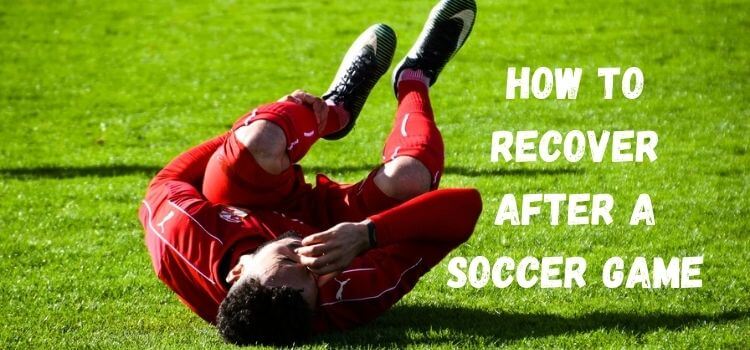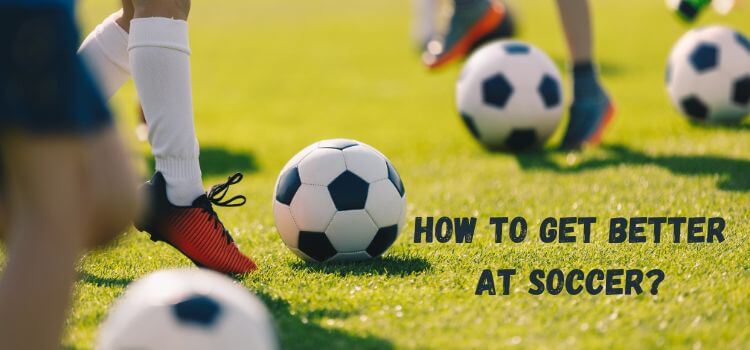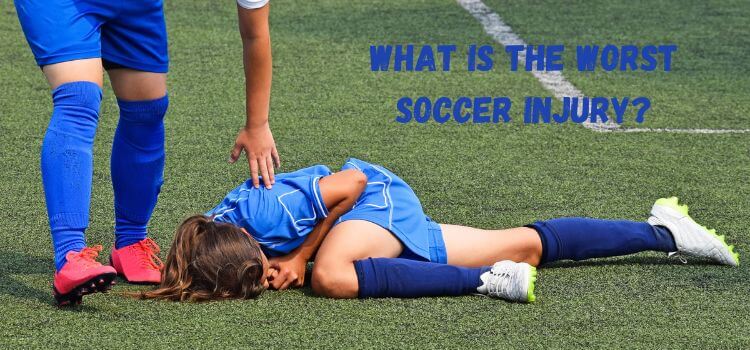As an Amazon Associate, I earn from qualifying purchases
The joy of the game is only one aspect of playing soccer; another aspect is how well you recover once the game is over. Injuries can be avoided, and proper healing can maintain maximum performance. The techniques to assist you in recovering after a brutal match will be covered in this article.

Immediate Post-Game Recovery
Cool Down Exercises
Cooling down is often overlooked, but it’s a critical part of recovery. The prevention of muscle stiffness and the restoration of an average heart rate are also benefits of this treatment. Try light jogging or walking, followed by gentle stretching to help your body transition from intense activity to rest.
Rehydration
Soccer is a high-intensity sport that makes you sweat significantly, leading to significant fluid loss. Rehydrating immediately after the game helps restore the body’s fluid balance, which is essential for muscle function and recovery. Water is great, but sports drinks that replace electrolytes lost through sweat can be even more effective.
Nutritional Recovery
Post-Game Nutrition
Your body needs fuel to recover, and what you eat after a soccer game can make a big difference. Aim for a balanced meal with carbohydrates to replenish glycogen stores, protein to repair muscle tissue, and healthy fats.
Foods like chicken with brown rice and vegetables and smoothies made with fruits and protein powder are also ideal for consumption.
Supplements for Recovery
Even though whole foods should be your primary source of nutrition, certain supplements might be helpful in the recovery process.
BCAAs, which are branched-chain amino acids, omega-3 fatty acids, and magnesium, are all substances that have the potential to alleviate muscular discomfort and inflammation. You must consult a fully licensed medical practitioner before initiating any new supplement regimen.
Physical Recovery Techniques
Stretching
After a game, stretching can help release muscle tension and increase flexibility, essential for avoiding injuries. Pay attention to the primary muscles involved in the game, such as the calves, quadriceps, and hamstrings. Hold each stretch for at least 30 seconds to get the full benefit.
Foam Rolling
One type of self-myofascial release that helps reduce inflammation, pain, and tightness in the muscles is foam rolling. By applying pressure to specific points on the body, foam rolling helps break down muscle knots and increase blood flow. Roll slowly over each muscle group for about one to two minutes.
Rest and Sleep
Importance of Sleep
Sleep is when your body does most of its repair work, making it a crucial part of recovery. For your body to rejuvenate and your muscles to mend, get between seven and nine hours of sleep per night. To enhance the quality of your sleep, develop a pre-sleep regimen. For example, switch off your electronics an hour before bed.
Rest Days
Taking a rest day doesn’t mean being completely inactive. Engage in light activities like walking, yoga, or swimming to keep your body moving without overexerting yourself. Active recovery helps maintain blood flow to muscles and can reduce soreness.
Injury Prevention and Care
Identifying Minor Injuries
It’s common to experience minor injuries like muscle strains and sprains after a game. The RICE method (Rest, Ice, Compression, Elevation) can help manage these injuries. Getting professional help is crucial if the pain continues or gets worse.
When to See a Professional
Knowing when to seek professional advice is the secret to keeping minor injuries from turning into serious problems. If you experience severe pain, swelling, or reduced mobility, it’s time to see a doctor, physiotherapist, or sports injury specialist.
Mental Recovery
Relaxation Techniques
Recovery of the mind is equally as vital as physical health. Deep breathing, meditation, and visualization can help you relax and reduce stress. Taking time to unwind mentally will improve your overall well-being and performance.
Reflecting on Performance
Reflecting on your performance helps you identify areas for improvement and recognize your strengths. Keep a journal to note what went well and what could be better. When improving oneself and one’s game, constructive reflection may be helpful.
Utilizing Recovery Tools and Technology
Recovery Gadgets
Various gadgets, such as massage guns, compression boots, and electric muscle stimulators, are designed to aid recovery. These tools can enhance blood flow, reduce muscle soreness, and accelerate recovery. Make sure to follow the manufacturer’s guidelines for optimal use.
Apps for Recovery
Technology can be a great ally in your recovery process. Apps like MyFitnessPal, Strava, and WHOOP offer features to track your recovery progress, provide personalized recommendations, and even monitor your sleep patterns. Make the app a part of your rehabilitation regimen by selecting one that meets your needs.
Conclusion
Recover is a complex process that calls for attention to many facets, including physical rest, diet, water, and mental calm following a soccer game. Putting these tactics into practice may lower your chance of injury, improve your performance, and guarantee a speedy recovery. Remember, prioritizing recovery is about bouncing back faster and sustaining a long and healthy soccer career.
FAQs
Aim for a well-balanced meal with healthy fats, protein, and carbs. Meals like a fruit smoothie with protein powder or chicken with brown rice and veggies are fantastic options.
Start your recovery immediately after the game with excellent down exercises and rehydration. Follow up with a nutritious meal within 1-2 hours.
Yes, recovery gadgets like massage guns and compression boots can enhance blood flow, reduce muscle soreness, and speed up recovery. They are a valuable addition to your recovery routine.
Prevent injuries by cooling down properly, staying hydrated, eating a balanced diet, stretching, and using recovery tools. Pay attention to your body and rest when needed.
Absolutely. Mental recovery helps reduce stress, improve focus, and enhance overall well-being, contributing significantly to your performance on the field.
Read Our More Articles
- Why Can’t You Take Off Your Shirt in Soccer? A Closer Look
- What to Do Before Soccer Game: Tips and Tricks
- How to Prepare for a Soccer Game: Strategies for Success
As an Amazon Associate, I earn from qualifying purchases


